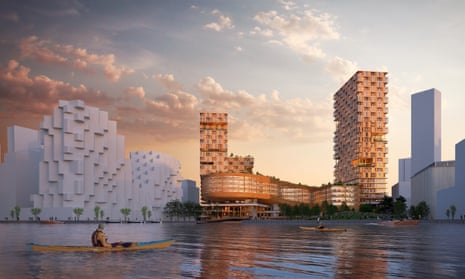A controversial smart city development in Canada has hit another roadblock after an oversight panel called key aspects of the proposal “irrelevant”, “unnecessary” and “frustratingly abstract” in a new report.
The project on Toronto’s waterfront, dubbed Quayside, is a partnership between the city and Google’s sister company Sidewalk Labs. It promises “raincoats” for buildings, autonomous vehicles and cutting-edge wood-frame towers, but has faced numerous criticisms in recent months.
The latest critique comes with just over a month to go before the city decides to approve or reject the project. It was prepared by the Digital Strategy Advisory Panel, an arms-length group that advises Waterfront Toronto, which oversees the sprawling development.
The group of technology experts called the master plan “somewhat unwieldy and repetitive” in the 99-page document released Tuesday.
“Panelists felt that [the Sidewalk Labs master plan] did not appear to put the citizen at the centre of the design process for digital innovations, as was promised in the beginning and is necessary for legitimacy,” the report said.
Panelists also felt that certain innovations were “irrelevant or unnecessary”.
For months, critics have pointed to the project’s numerous ambiguities, largely around the prospect of mass data collection.
“The smart city project on the Toronto waterfront is the most highly evolved version to date of … surveillance capitalism,” said American investor Roger McNamee in a June letter to Toronto city council, in which he called for the project to be scrapped.
For its part, Sidewalk Labs has worked to counter fears that data will be shared with third parties, instead advocating for a “data trust” to protect sensitive information.
In mid-June, however, Sidewalk Labs stirred controversy again when it presented its 1,500-page master plan. Waterfront Toronto had initially asked for 12 acres of development, but the Google affiliate instead presented a vision for 190 acres of prime waterfront land.
This week’s report expressed concerns over integrating the project into pre-existing infrastructure, and also took issue with the format of the master plan itself.
“The document lacks a detailed table of contents, an index, clickable links within endnotes, a consolidated and searchable version, or a non-pdf online version,” said panelists, which they claimed called into question Sidewalk Labs’ commitment to usability and accessibility.
While the report is a collection of preliminary comments and not a formal criticism, it suggests a number of concerns remain. Representatives from Sidewalk Labs will meet with the panel on Thursday to discuss the issues raised in the report.
Waterfront Toronto and Sidewalk Labs have until 31 October to iron out differences in order for the project to win approval.
Follow Guardian Cities on Twitter, Facebook and Instagram to join the discussion, catch up on our best stories or sign up for our weekly newsletter
